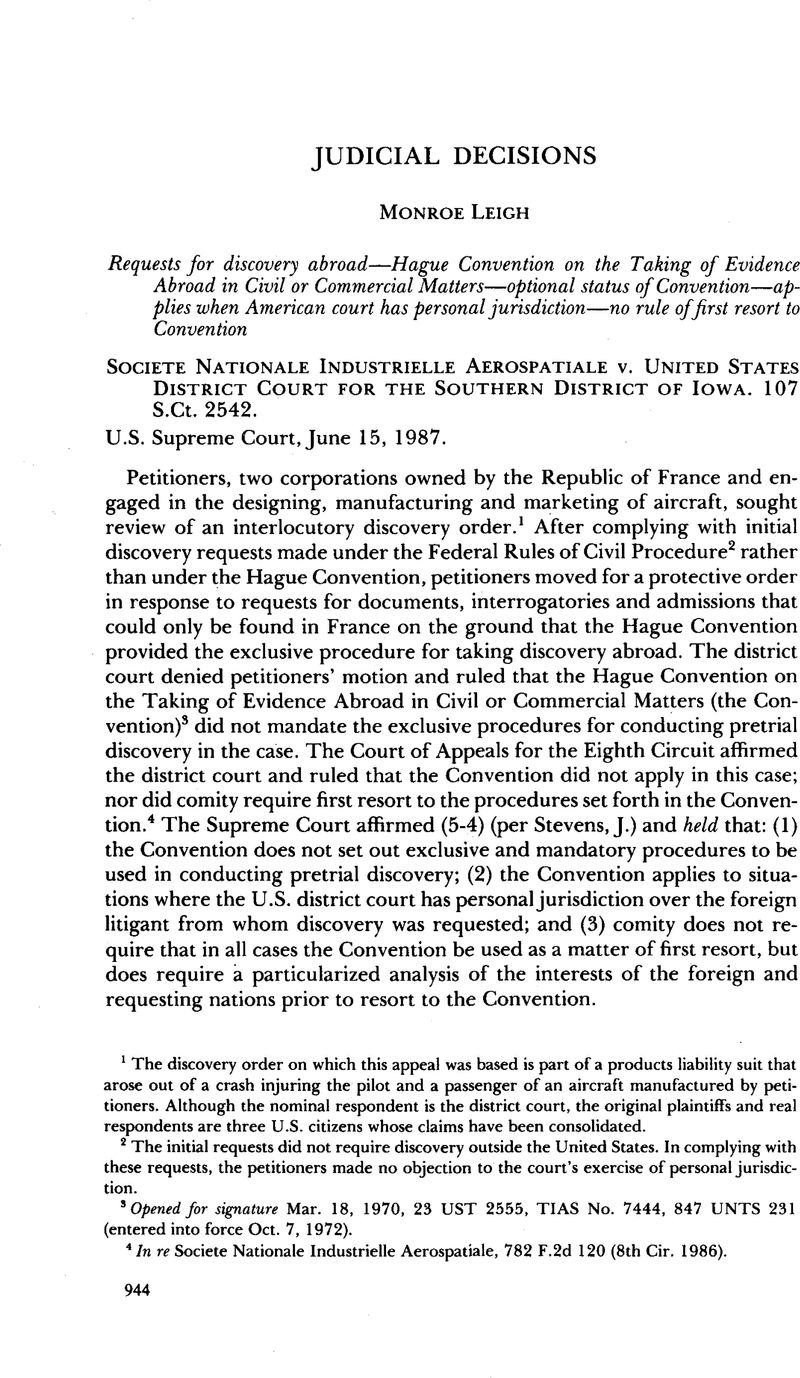Published online by Cambridge University Press: 27 February 2017

1 The discovery order on which this appeal was based is part of a products liability suit that arose out of a crash injuring the pilot and a passenger of an aircraft manufactured by petitioners. Although the nominal respondent is the district court, the original plaintiffs and real respondents are three U.S. citizens whose claims have been consolidated.
2 The initial requests did not require discovery outside the United States. In complying with these requests, the petitioners made no objection to the court’s exercise of personal jurisdiction.
3 Opened for signature Mar. 18, 1970, 23 UST 2555, TIAS No. 7444, 847 UNTS 231 (entered into force Oct. 7, 1972).
4 In re Societe Nationale Industrielle Aerospatiale, 782 F.2d 120 (8th Cir. 1986).
5 107 S.Ct. 2542, 2546.
6 See Trans World Airlines v. Franklin Mint Corp., 466 U.S. 243, 253 (1984).
7 107 S.Ct. at 2551.
8 Id. at 2550.
9 The Court concluded that foreign litigants in U.S. courts would have an unfair competitive advantage because they could make use of discovery procedures contained in the Convention as well as the Federal Rules (whichever proved less burdensome) for discovery in the United States. Domestic litigants, however, would be limited to first exhausting procedures containedin the treaty.
10 107 S.Ct. at 2556.
11 Id. at 2557 (footnote omitted). To guide courts on the concerns to be addressed in the comity analysis, the Court referred to the Restatement of Foreign Relations Law of the United States (Revised) §437(1)(C) (Tent. Draft No. 7, 1986) (Revised Restatement) (approved May 14, 1986). Although the Court recognized that the relevant provision of the Revised Restatement “may not represent a consensus of international views,” the Court nonetheless noted that the factors listed in the Revised Restatement “are relevant to any comityanalysis.” Slip op. at 20 n.28. The Court quoted the following factors from the Revised Restatement as those that should be considered in ordering foreign discovery when objections are made by the requested state:
(1) the importance to the . . . litigation of the–documents or other information requested;
(2) the degree of specificity of the request;
(3) whether the information originated in the United States;
(4) the availability of alternative means of securing the information; and
(5) the extent to which noncompliance with the request would undermine important interests of the United States, or compliance with the request would undermine important interests of the state where the information is located.
The Court also observed that laws of the requested state that forbid the discovery ordered under the Federal Rules, such as the French blocking statute in this case, are to be taken into account by the district court as an expression of the foreign government’s interests in the case.
12 107 S.Ct. at 2557–58 (Blackmun, J., concurring in part and dissenting in part).
13 Id. at 2559.
14 See Kerr v. United States Dist. Court, 426 U.S. 394, 402–05 (1976).